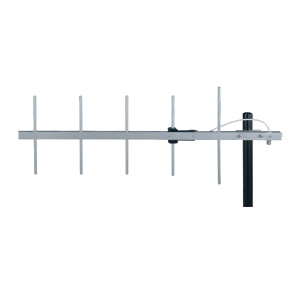Your shopping cart is empty!
MENU

Yagi antennas are highly directional and made of several short elements mounted across an insulated support. Yagi directional antennas have a driven element, a dipole, with several coupled parasitic elements known as reflectors and directors. Together they work to produce waves of RF energy focused in a particular direction. Yagi antennas usually have a narrow bandwidth, which means they are efficient only over a small range of frequencies.
When you need a highly directional antenna with substantial gain, Yagi antennas are the choice. They’re economical and suited for outdoor installation. For instance, if you need to increase cell phone signal strength within a building, install an outdoor Yagi antenna and aim it at the nearest cell tower. With gain typically in the 8 to 12 dBi range, the Yagi antenna will pull in signals from the tower and send outgoing signals to it to improve cell phone communications.
Westward Sales offers more than a dozen Yagi antennas that cover the most in-demand frequency bands.
You’ll find dual-band yagi antenna models designed for Wi-Fi that cover both the 2.4 and 5 GHz bands. Others offer coverage of bands between 200 - 250 MHz, 320 - 340 MHz, 406 - 512 MHz, 440 - 480 MHz, 698 - 930 MHz, 806 - 960 MHz, 866 - 960 MHz, and 900 - 930 MHz — which gives you options for virtually any application.
Yagi antennas are most efficient — measured by the ratio of radiated power to input power applied to the antenna feed point — when they operate at resonance. Operating outside that frequency increases the VSWR and reduces efficiency dramatically. VSWR greater than 3:1 makes an antenna extremely inefficient. The Mobile Mark Y42400WB wideband Log Periodic UHF Yagi antenna offers an excellent VSWR less than 1.5:1 over 400 to 800 MHz at 9 dBi gain. The unit handles up to 150 watts and is commonly used in demanding mobile wireless networking, fixed-site installation, and land mobile radio.
The YAG8-W directional dual-band Wi-Fi Yagi antenna covers both the 2.4 - 2.5 GHz and 4 - 6 GHz bands with VSWR less than 2.0:1. The unit is enclosed in a UV-resistant, white radome made from a white ASA material, which blends in well with most settings. Indoors, it can boost Wi-Fi in building corridors and other areas where reception is poor, or it can be pole-mounted outside.
Cellular antenna design and engineering is an exacting task, especially with the advent of MIMO designs. One MIMO model popular with cellular professionals is the 9-element Y42700WB-2X Yagi antenna which supports 5G LTE and CBRS cellular networks. This high-performance 2x2 MIMO Yagi antenna covers a frequency range from 600 MHz to 6 GHz, offers a VSWR less than 2.0:1, and features 14 dBi gain up to 4.2 GHz and 6 dBi from 4.2 to 6 GHz.
Yagi antennas offer long-range, directional signal strength ideal for industrial, remote, and point-to-point applications. At Westward Sales, our specialists are ready to help you select the model that fits your frequency, gain, and environmental requirements. With years of hands-on experience, we make it easy to match your project to the right antenna, fast.
Contact us today to speak with a sales engineer and get expert guidance on your Yagi antenna selection.